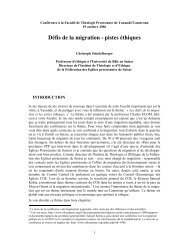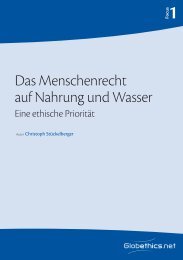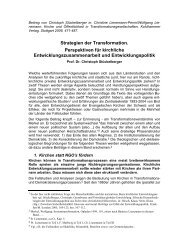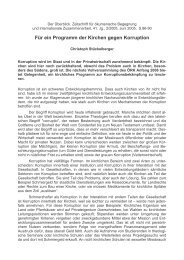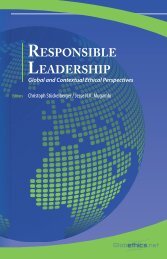BREAK THE CHAINS OF OPPRESION AND THE YOKE OF ...
BREAK THE CHAINS OF OPPRESION AND THE YOKE OF ...
BREAK THE CHAINS OF OPPRESION AND THE YOKE OF ...
Create successful ePaper yourself
Turn your PDF publications into a flip-book with our unique Google optimized e-Paper software.
FuturE nally prove to be meaningless and ineffective but will find a place in God’s purpose<br />
for the redeeming of the world. Hope is thus a reason for bold action in the<br />
world in accordance with God’s will for creation, not an excuse for inaction.<br />
Reflection 4<br />
The two ways of misunderstanding Christian hope have tended to make<br />
Christians slow to respond to the threat of climate change.<br />
● What is your reaction to them?<br />
● Do you or your church see or do things any differently?<br />
Look up the Bible references given above.<br />
● What do they say to you about Christian hope?<br />
● What do they say to you about the hope that God is calling you to?<br />
If you made the collage, add a sign of hope to it.<br />
The human vocation to love and do justice<br />
The Bible provides no shortage of counsel for how humankind should live in accordance<br />
with God’s will, bearing significantly on the question of climate change.<br />
Jesus summarizes the Jewish law in the commandments to love God and love the<br />
neighbour (Mk. 12.29–31). Our love of God is demonstrated in our response to<br />
the seventh day of creation, in a Sabbath commitment to worship and interruption<br />
of our daily work. This love, in response to the covenant God made with all<br />
living creatures after the flood (Gen. 9), cannot wholly be distinguished from the<br />
second call to love of neighbour: Luke’s gospel follows this two-fold commandment<br />
with the parable of the Good Samaritan as an example of neighbourly love<br />
(Lk. 10.25–37). This love is linked in Matthew’s shocking identification of Christ<br />
with those in need �in his �image �of God’s judgement � of �those<br />
who fed the hungry,<br />
gave water to the thirsty, welcomed the stranger, clothed the naked, cared for the<br />
sick and visited those in prison – and of those who did not (Mt. 25.31–46). In<br />
this account those in need are particularly identified with Christ. This priority is<br />
echoed in Jesus’ ‘Nazareth manifesto’ where he declares he has been anointed by<br />
the Spirit to bring good news to the poor, release to the captives, recovery of sight<br />
to the blind, to let the oppressed go free and to proclaim the year of the Lord’s<br />
favour (Lk. 4.18–19). The beatitudes similarly announce God’s blessing on the<br />
poor, the mourning, the meek, those who hunger and thirst for righteousness, the<br />
merciful, peacemakers and the persecuted. Luke follows this with a catalogue of<br />
the woes to fall on those who are rich, full, laughing, and well-regarded by others<br />
(Mt. 5.3–12; Lk. 6.20–26). There is no doubt that Christ’s disciples should show<br />
particular concern for the poor and vulnerable.<br />
The New Testament demand to love the neighbour, with particular attention to<br />
the poor, can be seen in continuity with the emphasis in Jewish law and Jewish<br />
prophetic writings. Jewish law made particular provision for those in need, as<br />
well as establishing economic structures such as the Jubilee to prevent differences<br />
������������������������������������������������<br />
� � � � ������������������������<br />
�<br />
154<br />
– Hope in God’s Future –



